
Community Drinking Water Treatment Plant
Get Price Quote
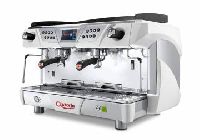
beverage equipment
Get Price Quote
Plus 4 You TS is a machine from Astoria’s Green Line: these machines have a low environmental impact and can reduce consumption by up to 47.6%* compared to traditional coffee machines. Thanks to an innovative software that manages the automatic standby during operating pauses, the night Energy-saving feature and the intelligent adjustment of the temperatures, Plus 4 You TS distributes the power only where and when it is needed.
Best Deals from Beverage Making Plant
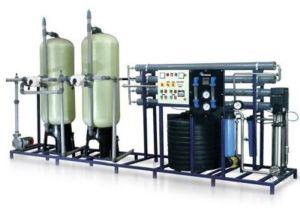
Drinking Water Plant
50,000 Per Piece
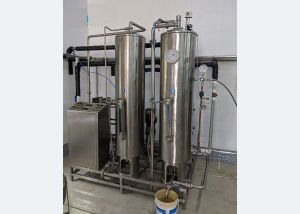
Fully Automatic Soda Soft Drink Plant
2,500,000 - 12,500,000 Per Piece
1 Plant (MOQ)
Most soft drinks are made at local bottling and canning companies. Brand name franchise companies grant licenses to bottlers to mix the soft drinks in strict accordance with their secret formulas and their required manufacturing procedures. Clarifying the water The quality of water is crucial to the success of a soft drink. Impurities, such as suspended particles, organic matter, and bacteria, may degrade taste and color. They are generally removed through the traditional process of a series of coagulation, filtration, and chlorination. Coagulation involves mixing a gelatinous precipitate, or floc (ferric sulfate or aluminum sulfate), into the water. The floc absorbs suspended particles, making them larger and more easily trapped by filters. During the clarification process, alkalinity must be adjusted with an addition of lime to reach the desired pH level. Filtering, sterilizing, and dechlorinating the water The clarified water is poured through a sand filter to remove fine particles of floc. The water passes through a layer of sand and coarser beds of gravel to capture the particles.Sterilization is necessary to destroy bacteria and organic compounds that might spoil the water's taste or color. The water is pumped into a storage tank and is dosed with a small amount of free chlorine. The chlorinated water remains in the storage tank for about two hours until the reaction is complete. An activated carbon filter dechlorinates the water and removes residual organic matter, much like the sand filter. A vacuum pump de-aerates the water before it passes into a dosing station. Mixing the ingredients The dissolved sugar and flavor concentrates are pumped into the dosing station in a predetermined sequence according to their compatibility. The ingredients are conveyed into batch tanks where they are carefully mixed; too much agitation can cause unwanted aeration. The syrup may be sterilized while in the tanks, using ultraviolet radiation or flash pasteurization, which involves quickly heating and cooling the mixture. The water and syrup are carefully combined by sophisticated machines, called proportioners, which regulate the flow rates and ratios of the liquids. The vessels are pressurized with carbon dioxide to prevent aeration of the mixture. Carbonating the beverage Carbonation is generally added to the finished product, though it may be mixed into the water at an earlier stage. The temperature of the liquid must be carefully controlled since carbon dioxide solubility increases as the liquid temperature decreases. Many carbonators are equipped with their own cooling systems. The amount of carbon dioxide pressure used depends on the type of soft drink. For instance, fruit drinks require far less carbonation than mixer drinks, such as tonics, which are meant to be diluted with other liquids. The beverage is slightly over-pressured with carbon dioxide to facilitate the movement into storage tanks and ultimately to the filler machine. Filling and Packaging The finished product is transferred into bottles or cans at extremely high flow rates. The containers are immediately sealed with pressure-resistant closures, either tinplate or steel crowns with corrugated edges, twist off, or pull tabs. Because soft drinks are generally cooled during the manufacturing process, they must be brought to room temperature before labeling to prevent condensation from ruining the labels. This is usually achieved by spraying the containers with warm water and drying them. Labels are then affixed to bottles to provide information about the brand, ingredients, shelf life, and safe use of the product. Most labels are made of paper though some are made of a plastic film. Cans are generally pre-printed with product information before the filling stage. Finally, containers are packed into cartons or trays which are then shipped in larger pallets or crates to distributors.

Cocktail Shaker Barware Drink Mixer
Get Price Quote

Drinking Water Treatment Plant
Get Price Quote
We design Water Treatment Plants after analyzing water conditions at source. Apart from water treatment system, the water is tested first to determine the level, type, quantity of contaminants present in the water. Our plants provide cost effective solutions to remove all possible contaminants and foreign particles that pose health risks. These plants also help in removing foul tastes and odors so that the water can be used for irrigation, cleaning and other uses. Drinking Water Treatment Plant We offer a wide variety of filtration technologies for drinking water treatment ranging from individual home units, to emergency response systems, to shipboard water treatment systems, to transportable military units, to large-scale municipal ultra filtration and desalination systems. Our Reverse Osmosis system frequently uses to reduce the levels of total dissolved solids and suspended particles within water. These systems remove a variety of ions and metals as well as certain organic, inorganic and bacterial contaminants. The RO membrane alone may not be an effective method for total removal of these contaminants but a properly designed system may be effective in reducing these contaminants to safe levels. We also use other methods that are as follows:Demineralization or Deionization is the process of removing mineral salts from water by using the ion exchange process. With most natural water sources it is possible to use Demineralization and produce water of a higher quality than conventional distillation. We design, manufacture and install demineralization requirements by using different types of cation and anion resins such as, strong acid, weak acid, strong base and weak base to optimize the performance of a deionizer and to achieve the best output quality at lowest chemical costs. Softeners Water Hardness exists in significant areas of the country that result in disappointing white scales on fixtures, appliances and piping. Softening of water produces immediate benefits such as reduced usage of soap and detergent, cleaner clothes and better taste of food and beverages. Our Water Softener Plant softens the water which protects household appliances & sanitary fittings making them look new, always. It also provides a soft feel to hair, clothes and skin. It saves water and salt. It controls the water pump operation so that there is no shortage or wastage of soft water, thus saving the electricity. Research Scientific Equipment Products by Matrix Eco Solution: - Autoclave (vertical, horizontal & rectangular), bio-safety cabinet, blood bank refrigerator, bacteriological incubator, co2incubator, B.O.D incubator, egg incubator, deep freezer(up to -860c), fume hoods, hot-air oven, laminar air flow (vertical & horizontal), orbital shaking incubator, B.O.D –cum –shaker, rotary shaker, walk in incubator, environmental chamber, water bath ,humidity cabinets & plant growth chamber, seed germinator, muffle furnace, air curtain, mortuary chamber etc.
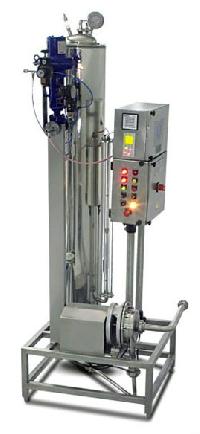
Soda Carbonator
Get Price Quote
Our Soda Carbonator is designed with the latest technology. The Soda Carbonator is used in the manufacturing setup for mixing CO2 gas in soda other aerated beverages. PLC is used to control the pressure and liquid level in the Soda Carbonator. The Soda Carbonator features an alarm, which activates in case of any abnormality and the machine stops automatically. With stable performance and high efficiency, Soda Carbonator is also easy to operate.

carbonated drink plant
Get Price Quote
Soft drinks are enormously popular beverages consisting primarily of carbonated water, sugar, and flavorings. Nearly 200 nations enjoy the sweet, sparkling soda with an annual consumption of more than 34 billion gallons. Soft drinks rank as America’s favorite beverage segment, representing 25% of the total beverage market. In the early 1990s per capita consumption of soft drinks in the U.S. was 49 gallons, 15 gallons more than the next most popular beverage, water.
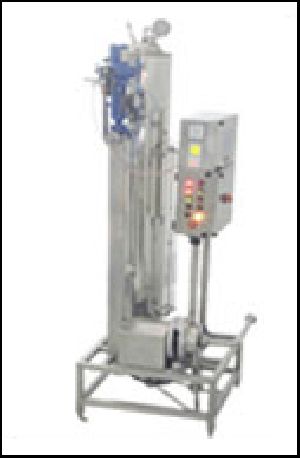
Automatic Carbonator
Get Price Quote

soda water plant
Get Price Quote
soda water plant

packaged drinking water plant
Get Price Quote
packaged drinking water plant, Grand RO System, Hard Water Softeners

Carbonator
Get Price Quote
Carbonator

carbonation machine
Get Price Quote
carbonation machine, Automatic Carbonator